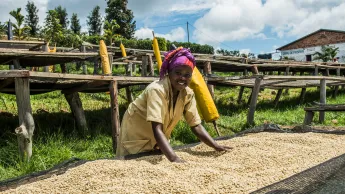Sustainable coffee made by empowered women
- 2022-04-08
- Christina Pfänder
- Comment

From cultivation to roasting and packaging: the multiple award-winning Rwandan speciality coffee is produced exclusively by women. The co-founder of the Fairtrade project is Allan Mubiru, alumnus of the Alexander von Humboldt Foundation’s International Climate Protection Fellowship. In order to launch the product in 2018, the economist and climate finance expert launched a successful crowdfunding campaign.
Aromatic Arabica beans from the mountains of Rwanda, hand-picked, with a gentle berry note – and lots of woman power. Angelique’s Finest is grown exclusively by Rwandan smallholder women farmers who are independently organised as cooperatives. What is particularly noteworthy here is that the women farmers own the trademark rights, so they have control over the entire value chain. This offers numerous benefits: ‘Our model means the women farmers earn 55 per cent more than they would in the conventional coffee trade,’ explains co-founder of the initiative Allan Mubiru. ‘They are independent of the major coffee producers, middlemen and the fluctuating world market price for green coffee.’
Successful crowdfunding
In order to launch the product on the German market in 2018, Mubiru used crowdfunding. He set up an online platform and used social media to draw attention to the German-Rwandan project, featuring photos, a blog, videos and a wealth of information. In doing so, he inspired numerous coffee lovers to support the FairChain approach, which now allows tracking via a blockchain system by means of a QR code on each package. ‘We wanted to achieve EUR 50,000 within a period of four months so as to be able to pre-finance 2,000 kilograms of coffee and import it to Germany – and in the end we actually achieved even more than that!’ recalls Mubiru. ‘By way of a thank you, we gave our supporters a corresponding amount of Angelique’s Finest.’
Good start-up capital and efficient advertising for the social business start-up: Angelique’s Finest has since become available at the online stores of German supermarkets, too. In 2018, the company marketed 6,600 kilos of coffee and espresso beans – selling more than 15,000 kilos of the product by 2020. ‘Our current target is to export around 50,000 kilos,’ says Mubiru. ‘That is 50 per cent of the beans harvested by the women. We currently sell the other 50 per cent as green coffee to the major international coffee producers at a low price.’ But that is set to change in the near future: ‘Next year, we aim to distribute 100 per cent of the coffee from the women’s cooperatives ourselves.’
By ship to Hamburg for roasting
The project is already boosting the financial independence and social participation of the approximately 1,800 women farmers: ‘Women are responsible for sowing, tending the plants and harvesting, but financially and structurally it is usually the men who benefit from the coffee bean trade,’ says Mubiru. ‘Moreover, much of the cultivated land is owned by men.’ Angelique’s Finest counteracts this injustice: the women producers are not only in charge of the cultivation, they also have complete control of the roasting and marketing of the beans.
However, the coffee cooperative has since handed over the refining of the coffee cherries to roasting specialists in Hamburg. ‘To prevent it losing its flavour, the finished product has to go on the market as soon as possible after roasting,’ explains Mubiru. ‘We decided to take this step because we don’t transport the beans from Rwanda to Germany by plane but by ship – for both financial and ecological reasons.’ Sustainability is a key consideration when it comes to cultivation, too: ‘The plants grow in mixed cultures according to the permaculture principle,’ says Mubiru. ‘This has a positive impact on biodiversity, for example.’
Democratically organised coffee cooperatives
Mubiru developed the idea for Angelique’s Finest while he was doing his Alexander von Humboldt Foundation International Climate Protection Fellowship in Berlin, where he was employed by the non-profit organisation atmosfair. ‘Together with my colleague, I travelled to Rwanda several times at that time to pursue climate protection projects,’ he recalls. ‘We would always bring an original coffee back as a gift for our friends in Berlin. This gave rise to the idea of giving coffee farmers direct access to the German coffee market so that they could participate in the finished product while retaining their autonomy.’
Back in Rwanda, he founded the coffee cooperative Kaffeekoop GmbH together with his colleague Xaver Kitzinger of atmosfair. Kaffeekoop’s partner is the company Rwashoscco, which is owned by six Rwandan farmer cooperatives. ‘The cooperatives already existed in Rwanda at that time,’ explains Mubiru. ‘Each cooperative has a women’s association for the female members who now produce Angelique’s Finest.’ Kaffeekoop is responsible for marketing in Germany and organised the crowdfunding campaign. ‘We developed the Angelique’s Finest brand together with Rwashoscco, and now the coffee farmers hold all rights through Rwashoscco,’ says Mubiru. ‘In addition, the speciality coffee is named after the managing director of Rwashoscco – Angelique Karekezi.’
Continue reading on the Alumniportal Deutschland
In our round-up talk, five international experts who deal with the topic of social innovation and entrepreneurship in very different ways answer five questions on the topic. They also give tips for people who also want to convert their innovative ideas into concrete solutions and social and sustainable business concepts.
In our expert interview, five Germany alumni report on where they see inequality and need for more social justice and how they are working with their projects and initiatives to promote more equality. They also give specific tips for those who also want to campaign for equal opportunities.
